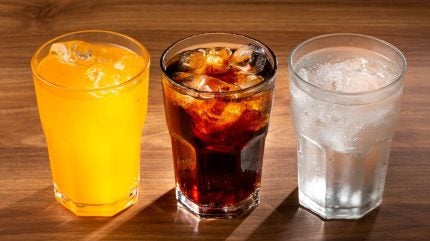
Sugary-soft-drinks production in Germany was up 6% year-on-year in 2023 to 7.76 billion litres, according to findings from the national federal statistics office.
This equates to 93 litres of sugary drinks produced per capita, Destatis said.
The soft drinks produced in this period included cola, lemonade, energy drinks and fruit-flavoured carbonated drinks.
Cola, cola-mixed drinks and lemonade accounted for the largest share of production in 2023 at 71%, making up a total of 5.5 billion litres.
Soft drinks were said to be particularly popular with German consumers “as a thirst quencher, especially on hot days”.
Processing of ‘light’ variants of cola and lemonade drinks in 2023 has grown 12.7% on 2013, to 1.45 billion litres. However, production of these varieties last year dipped by 5.5% on 2022, when 1.53 billion litres of light soft drinks were made.
Across a ten-year period, the levels of production have remained fairly steady. In 2013, 7.74 billion litres of sugary soft drinks were manufactured in the country. The highest point of production was in 2018, when 8.1 billion litres were produced.
The news comes as Germany’s government pushes for more reformulation to cut the level of sugar, as well as fat and salt in food and drinks produced in the country.
Data published by the Federal Ministry of Food and Agriculture (BMEL) in April, found that there was little change to the amount of sugar in drinks products.
A sample of soft drinks sold in the country between 2018 and 2022 found a 5% reduction in sugar, but that there was “no significant change” since 2019.
Researchers also said that there was no notable cut to sugar in fruit drinks made with added sugar within the same four-year period.
The results were published in BMEL’s second interim report, as part of its National Reduction and Innovation Strategy for Sugar, Fats and Salt in Finished Products, launched in 2018.
Despite the overall boost in sugary soft drinks production in the country, George Shaw, Germany beverages analyst at GlobalData, Just Drinks' parent group, told the publication the country would likely see a general shift to functional soft drinks in the future.
Shaw said: "Soft drinks categories related to functional beverages have been the fastest growing in Germany in 2023, these are energy drinks, sports drinks, and enhanced waters respectively. Consumers are increasingly drawn to beverages which offer a nutritional or functional benefit, as they focus on their diet and nutrition."
He added: "Further to this, in Germany, low calorie carbonated drinks saw a 4.2% increase in 2023 and are expected to see a further 1.7% increase in 2024. The majority of new releases in carbonates and energy drinks released in 2024 were low calorie in formulation.
"Alongside consumer demand for healthier products, the introduction of the 20% sugar tax in late 2023 has also strongly pushed companies towards low calorie production.
"We expect to see production continue to migrate from regular calorie to low calorie over the coming years as companies adjust their portfolio of products to be lower in sugar."



